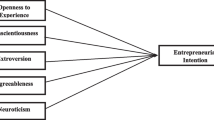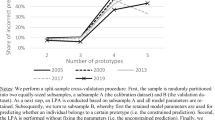Abstract
Personality resource of the individual as the subject of economic activity is an integral part of the human capital. The content study of the collective subjects’ representations in the process of educational and training activities gives an opportunity to estimate the personality efficiency in the future entrepreneurship, build an individual strategy of the personality adaptation to the market economy, and form the ability for the Humanities University graduate to start up a small business. The article gives a comparative analysis of representations about successful entrepreneur’s personality resource in the Humanities University graduates’ consciousness and representations of Far Eastern entrepreneurs having small businesses and foreign big business owners. The study of the personal qualities correlation structure in the respondents’ minds by means of stratification of correlation matrix method revealed differences between the three groups of responders. In the Humanities University students’ consciousness, such personal qualities of a successful entrepreneur as greed—slyness—education level and industriousness—initiative are connected at a medium level. In the small business entrepreneurs’ consciousness some other personal qualities are connected at the same (medium) level: entrepreneurial spirit—honesty and responsibility—communicability, while at a lower than medium level—responsibility—industriousness—benevolence. Big business representatives have the following variables connected at a higher than medium level: commitment to the cause—team spirit—self-confidence—ability to anticipate, patience—generosity—ability to anticipate, and at a medium level such qualities as ‘determination—adventurism’. Recommendations for building individual strategies of the future entrepreneur’s personality development in crisis economic conditions are offered.
Access this chapter
Tax calculation will be finalised at checkout
Purchases are for personal use only
Similar content being viewed by others
References
Richie, S., Martin, P.: Motivation Management/transl. from English ed. prof. E. A. Klimova. UNITY—DANA, Moscow (2004)
Boissiere, M., Knight, J., Sabot, R.: Earnings, schooling, ability and cognitive skill. Am. Econ. Rev. 75(5), 1016–1030 (1985)
Nemov, R.: Psychology. Book.1. Humanit. pub. centre VLADOS, Moscow (2003)
Asmolov, A.: Psychology of Personality: Textbook. Publishing House of Moscow State University, Moscow (1990)
Katkova, E., Pavlov R.: Entrepreneurship as an alternative employment option. In: Scientific Notes of KnAGTU: Sciences About Man, Society and Culture, No. II. 2(2), pp. 127–135. KnAGTU, Komsomolsk-on-Amur (2010)
Katkova, E., Shevchuk, O.: Entrepreneurial activity as an improvement in the quality of life of young people in an innovative economy. In: The Problem of the Quality of Life of Modern Youth. Proceedings on the All-Russian Correspondence Scientific and Practical Conference February 14–March 14, pp. 121–135. Publishing House of AmGPSU, Komsomolsk-on-Amur (2011)
Roshchina, Y.: Psychological Components of Human Capital as a Factor in Economic Behavior. HSE GU, Moscow (2008)
Gornostay, P., Titarenko, T. Ruta, (eds.): Personality Psychology: Dictionary Reference, Kiev (2001)
Stolyarenko, L.: Fundamentals of Psychology. Tutorial. (Series Higher Education). Phoenix, Rostov-on-Don (2003)
Bazarov, T., Aksenovskaya, L.: Socio-psychological technology of the region population entrepreneurial culture formation. National Psychol. J. 4(24), 87–97 (2016)
Hutmacher, V., Kochran, D., Botanni, N.: In Search of Capital in Education. L. Kluwer academic pub, Drdrecht, Boston (2001)
Hollander, J., Howard, J.: Social psychological theories on social inequalities. In: Social Psychology Quarterly. Special Millenium Issue on the State Sociol. Social Psychol. 63(4), 338–351 (2000)
Bowles, W.: IQ model, knowledge and earnings. Am. Econ. Rev. 65(5), 1002–1007 (1975)
Filblat, S., Gregory, S.: The role of the intellectual test and professional background as indicators of professional choice. Sociometry 19(3), 192–199
Doley, D., Poles, D., Ham-Rowbottom, K.: Part-time employment and depression: a direct link. J. Health Soc. Behav. 41(4), 421–436 (2009)
Katkova, E.: Professional personal development: methodological training for specialists in the vocational orientation of unemployed and job-seeking citizens in the employment service. Publishing House of AmGPSU, Komsomolsk-on-Amur (2007)
Katkova, E.: Combinatorial abilities of a person as the basis of entrepreneurial activity. Audit Fin. Anal. 4, 355–359 (2012)
Barron, F.: Personality as a function of human design of himself. Ques. Psychol. 2, 153–159 (1990)
Menegetti, A.: Psychology of the leader. Ontopsychology, Moscow (2006)
Varina, O.: Ethical analysis of entrepreneurship in Russia: Auto-Ref. diss.... candid. Philos. Sci. Saransk (2004)
Romanova, E.: 99 popular professions. In: Psychological Analysis and Job Descriptions, 2nd ed. Peter, St. Petersburg (2003)
Opevalova, E., Katkova, E., Shchegoleva, A.: Ways to achieve life satisfaction in representations of the unemployed. In: International Scientific Conference «Far East Con» Proceedings, pp. 328–337, Vladivostok
Sukhodolsky, G.: Fundamentals of mathematical statistics for psychologists: textbook. Publishing House of St. Petersburg University, St. Petersburg (1998)
Kovaleva, I., Fedosova, L.: Correlation pleiads method/comp. Belarusian National Technical University, Minsk (2014)
Sonuga-Barke, E., Webley, P.: Children’s economics: analysis in the development of economic behavior. Lawrence Erlbaum Associates, Hove, UK (1993)
Katkova, E.: The problem of developing the career competence of university graduates as a psychological factor in their employment. Amur Sci. Bullet. 2, 130–134 (2009)
Katkova, E.: Strategic career planning as a factor in the non-dangerous existence of graduates in the labor market. In: Opevalova, E. (ed.) Current Problems of Human Psychological Safety in a Modern Society: A Collection of Scientific Works. Publishing House of AmGPSU, Komsomolsk-on-Amur (2010)
Katkova, E., Pavlov, R.: Empirical study of the career potential of a graduate’s personality in the structure of human capital. In: Scientific Notes of KnAGTU, II-2 (18), 19–24 (2014)
Author information
Authors and Affiliations
Corresponding author
Editor information
Editors and Affiliations
Rights and permissions
Copyright information
© 2021 The Author(s), under exclusive license to Springer Nature Singapore Pte Ltd.
About this paper
Cite this paper
Katkova, E.N., Opevalova, E.V., Shchegoleva, A.V. (2021). Successful Entrepreneur’s Personality Resources in Representations of University Students and Businessmen. In: Solovev, D.B., Savaley, V.V., Bekker, A.T., Petukhov, V.I. (eds) Proceeding of the International Science and Technology Conference "FarEastСon 2020". Smart Innovation, Systems and Technologies, vol 227. Springer, Singapore. https://doi.org/10.1007/978-981-16-0953-4_13
Download citation
DOI: https://doi.org/10.1007/978-981-16-0953-4_13
Published:
Publisher Name: Springer, Singapore
Print ISBN: 978-981-16-0952-7
Online ISBN: 978-981-16-0953-4
eBook Packages: Intelligent Technologies and RoboticsIntelligent Technologies and Robotics (R0)




